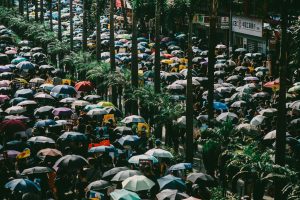Isabel Davies recounts her first teaching experience – at an English-medium school in Hong Kong
I first learned of TEFL from my older brother, who disappeared one summer to volunteer at a Romanian summer camp. Romania, to me, seemed very far away and exotic, and I worried incessantly about bear attacks, but when he returned unscathed and with lively stories from Transylvania, my perspective was changed.
By the time I started university, I had set my own sights on working abroad. As an English Literature student, teaching seemed like the natural route into working overseas.
I had limited experience, mostly tutoring jobs and volunteering, so the TEFL course I began in 2018 was my first teacher training, as well as my first introduction to phonics.
There were few jobs available to me when I began looking in May 2019, but one of them was with an English company in Hong Kong who were advertising entry-level teaching. I knew almost nothing about the city, but it seemed both far away and exotic. I applied, attended three interviews, and, five weeks after graduating, boarded a flight to Hong Kong.
I had one day to get acquainted with my new surroundings before initial training began. This consisted of a few days of orientation in the company’s head office before heading in for the first day of school.
My job was teaching Upper Primary Reading at Munsang College, a private English-medium school. I had eight classes, nearly 350 students, and would be working with six local teachers. I watched another teacher teach my lessons twice, then, having never taught a real school lesson in my life, it was my turn.
Being thrown in front of forty-five energetic pre-teens, whose language and culture was so different from my own, and who knew their school, their teachers and their course far better than I did, was an instant trial by fire.
My lesson plans had been written for me and adhered strictly to a curriculum of reading, vocabulary and discussion, and my main priority was to deliver the full content of these plans. I had 45 minutes to hit every point while maintaining the attention of the class.
Technically an assistant teacher, I was never alone in the classroom, but the success of my lessons was my responsibility, and the local teachers each had their own relationships with their classes that I needed to negotiate.
The energy of a teacher did not come naturally to me at first because my stage fright was so intense I thought I might pass out every time I stood in front of a class. Nerves, lack of experience and ignorance of Hong Kong culture conspired together, and, despite my best efforts, my first weeks of lessons were dire.
Hong Kong-ers work long hours, six days a week, and I became so exhausted and overwhelmed that I was struggling to maintain anything outside of work.
Hong Kong is an expat-filled city, rich with Western amenities and English speakers, and yet it still felt bewilderingly alien to me. Food shopping in supermarkets with aisles organised by country of import became an incomprehensible challenge for my fried brain.
Socialising with my fellow teachers exhausted what little emotional capacity I had left. I was homesick but had no time or energy to dwell on it. More than anything, I was terrified that teaching would never click, and I would spend the rest of the year living in this constant state of anxiety.
In late September, I began teaching after- school classes at Kei Wing, a government school, on top of my other lessons. My classes here were smaller, younger and learned through activities and games rather than books. This time I was alone in the classroom and quickly learned that the level of English was far lower than at the more privileged private school, where most students had attended a bilingual kindergarten.
At Kei Wing, some of my students didn’t know the words sit down, let alone how to construct a sentence. I was forced to adapt my teaching from what I had already learnt during my first four weeks and figure out how to teach children who had had limited exposure to English.
The difference in these students’ backgrounds was apparent when teaching from textbooks based on life in England, where I would attempt to explain the names of different rooms in a house to children whose families lived in a one-room flat, with bedroom, kitchen and living area combined.
Beyond the classroom, Hong Kong was a turbulent place to spend my first year in Asia. By October, the usual tourist thrum had halved and regular protests replaced the big city bustle.
I was finally settling in when a police siege of the Polytechnic University shut down schools for a week in November and trapped me with my colleagues in our apartment block, next door to the battleground of the Cross-Harbour Tunnel.
The protestors were rigidly well-organised and never intentionally endangered us, but it became difficult to explore when riot police and their accompanying tear gas regularly closed roads and MTR stations, trapping us unexpectedly as we moved around the city.
My students, already under huge pressures to perform, now faced the anxiety of intense political unrest. While we were advised not to talk about the protests in school, they became hard to ignore.
“Hong Kong is such a mess,” one of my students informed me sadly on Sports Day, two weeks after I had started at Munsang. Many children of wealthier Hong Kong families had dual nationality, and one student told me that her parents were increasingly arguing about emigrating. Her father insisted he would never leave; her mother insisted she would go anyway and take the kids with her.
Despite everything I saw, I know that I will never understand the hopelessness many Hong Kong-ers feel about their future.
Being a teacher gave me a unique insight into the protests’ impact on ordinary lives, and any inconvenience I experienced while avoiding the violence pales in comparison with the suffering of people who face the end of their city as they know it.
When the pandemic closed schools in February, it was another blow in what had already been a difficult year for the children of Hong Kong. My colleagues and I improvised materials to send home, recording lessons and imbedding them into colourful PowerPoint presentations, hoping it was enough to get the language across.
Though there was no official lockdown, most families chose to self-isolate, and when I began teaching over Zoom in April it was to students who hadn’t been outside in months, let alone practised English.
When I said goodbye to my classes for the last time in June, it was over Zoom – a detached and anticlimactic end to what had turned out to be, despite early difficulties, an amazing ten months of teaching. If you had told me in September that I would be in tears at the prospect of leaving, I wouldn’t have believed you.
Adapting to life in Hong Kong was a huge challenge that I managed thanks to an amazing group of fellow expat teachers, and to the amazing students who inspired me every day to be a better teacher, even when they were trying to annoy me (the thing about teaching English is that when a kid mutters ‘Wow, that’s SO interesting,’ behind your back, you secretly cheer at their perfect use of sarcasm).
I was lucky to keep my job, but my contract did eventually end up being cut short by two weeks. I had originally planned to return home slowly, reducing my carbon footprint and taking trains through China, Russia and Europe. Instead, I was forced to book one of limited direct flights to London, swap the backpacker route for a near-empty plane, sit eight seats away from the next masked passenger and watch the countries I was unable to visit pass beneath my window.
Landing in Heathrow was my first time experiencing a two-metre social distancing rule and I was suddenly paranoid of strangers in a way I hadn’t needed to be in Hong Kong. Two weeks of quarantine was not how I imagined my eventual return to the UK to be, but the pandemic actually made my adjustment back home easier: life in the UK feels strange, because it is.
Often, I have found traveling makes the world feel smaller, bringing seemingly unknowable places like Hong Kong into the known, but now the world has really shrunk. Travel is restricted in a way I have never experienced. I am currently applying for more jobs but I am wary of taking on anything as demanding as my position in Hong Kong.
I learned a huge amount across the year but if I have the choice I would rather develop my teaching through further guidance and training than through high- pressure trial and error. In terms of destination, if I could relocate to a place half as compelling as Hong Kong, I would consider myself lucky.

Visas and Immigration
Hong Kong has a big demand for high quality English teaching, both in schools and out, so there are many jobs available at various centres and schools around the city.
The visa needed to legally be employed in Hong Kong is called the Z Visa. Only registered schools are authorised to provide Z visas for their teachers. The government has set the following minimum requirements for all teachers applying for a visa:
- A bachelor’s degree (in just about any subject)
- Either two years of previous TEFL experience and/or a 120-hour TEFL certificate from a verifiable source / teaching qualification.
Attempting to gain employment in Hong Kong without these qualifications is not advised.
Generally speaking, teachers in Hong Kong are well paid. Average monthly salaries start at around £2,000 GBP, depending on the type of school and your experience. However, Hong Kong has a high cost of living and is among the world’s most expensive cities.





